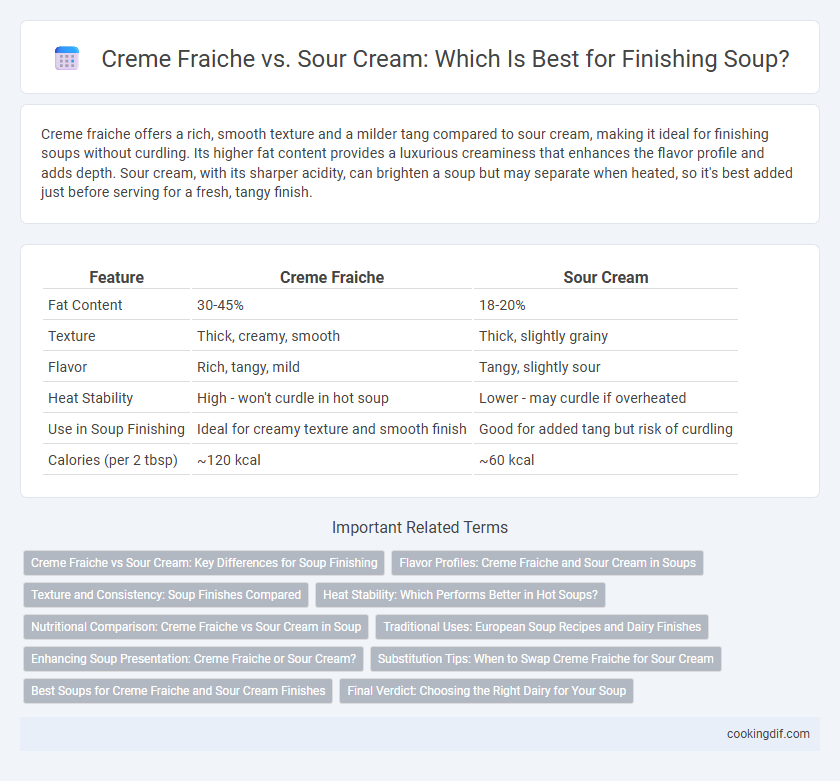Creme fraiche offers a rich, smooth texture and a milder tang compared to sour cream, making it ideal for finishing soups without curdling. Its higher fat content provides a luxurious creaminess that enhances the flavor profile and adds depth. Sour cream, with its sharper acidity, can brighten a soup but may separate when heated, so it's best added just before serving for a fresh, tangy finish.
Table of Comparison
| Feature | Creme Fraiche | Sour Cream |
|---|---|---|
| Fat Content | 30-45% | 18-20% |
| Texture | Thick, creamy, smooth | Thick, slightly grainy |
| Flavor | Rich, tangy, mild | Tangy, slightly sour |
| Heat Stability | High - won't curdle in hot soup | Lower - may curdle if overheated |
| Use in Soup Finishing | Ideal for creamy texture and smooth finish | Good for added tang but risk of curdling |
| Calories (per 2 tbsp) | ~120 kcal | ~60 kcal |
Creme Fraiche vs Sour Cream: Key Differences for Soup Finishing
Creme fraiche has a higher fat content and thicker texture than sour cream, making it ideal for finishing soups without curdling when heated. Sour cream's lower fat and tangier flavor can cause it to separate if added directly to hot soup, requiring careful tempering. Using creme fraiche enhances creaminess and stability, delivering a smooth, rich finish to soup dishes.
Flavor Profiles: Creme Fraiche and Sour Cream in Soups
Creme fraiche brings a rich, buttery flavor with a subtle tang that enhances the depth of soups without curdling when heated. Sour cream offers a sharper acidity and a creamier texture but may separate if exposed to high heat. Choosing creme fraiche maintains a smooth consistency and a more delicate balance of flavors, especially in creamy or delicate soups.
Texture and Consistency: Soup Finishes Compared
Creme fraiche offers a rich, velvety texture with a smooth consistency that blends seamlessly into soups without curdling, enhancing creaminess and depth. Sour cream, while tangier, can sometimes separate or curdle when added to hot soups, leading to a thinner, less stable finish. Choosing creme fraiche ensures a consistently luscious mouthfeel and ideal thickness, making it preferable for silky soup finishes.
Heat Stability: Which Performs Better in Hot Soups?
Creme fraiche exhibits superior heat stability compared to sour cream, making it ideal for finishing hot soups without curdling or separating. Its higher fat content, typically around 30%, allows it to withstand high temperatures while maintaining a smooth, creamy texture. Sour cream, with lower fat content near 20%, tends to curdle when exposed to prolonged heat, resulting in a less desirable consistency in hot soup applications.
Nutritional Comparison: Creme Fraiche vs Sour Cream in Soup
Creme fraiche contains higher fat content, typically around 30-40%, providing a rich, creamy texture to soups, while sour cream usually contains 18-20% fat, making it lighter but less stable when heated. Nutritionally, creme fraiche offers more calories and saturated fat per serving, whereas sour cream has fewer calories and slightly less fat but may curdle at high temperatures. Both provide beneficial probiotics, but creme fraiche's thicker consistency enhances soup flavor and mouthfeel without breaking down.
Traditional Uses: European Soup Recipes and Dairy Finishes
Creme fraiche is a staple in traditional French and Eastern European soups, valued for its rich, creamy texture and mild, slightly tangy flavor that blends smoothly without curdling when added to hot liquids. Sour cream, commonly used in Central and Eastern European cuisines such as Hungarian goulash and Russian borscht, offers a sharper tang and thicker consistency but can sometimes separate under high heat unless tempered carefully. These dairy finishes are essential in enhancing the depth and creaminess of classic European soups, with creme fraiche preferred for delicate soups and sour cream favored for heartier, robust flavors.
Enhancing Soup Presentation: Creme Fraiche or Sour Cream?
Creme fraiche enhances soup presentation with its rich, velvety texture and subtle tang, creating an elegant, creamy swirl that maintains shape without curdling in hot liquids. Sour cream, while tangier and slightly thinner, may break down faster when added to hot soups, resulting in a less polished finish. For a visually appealing and smooth garnish, creme fraiche is preferred due to its stability and luxurious mouthfeel.
Substitution Tips: When to Swap Creme Fraiche for Sour Cream
Creme fraiche can be substituted for sour cream when finishing soups to achieve a richer, creamier texture without curdling under heat, thanks to its higher fat content of around 30-40%. Sour cream, with a tangier flavor and lower fat content (approximately 18-20%), works best in recipes where a sharper taste and lighter consistency are desired. When swapping, add creme fraiche off heat to maintain its smoothness, while sour cream may require tempering to prevent splitting in hot soups.
Best Soups for Creme Fraiche and Sour Cream Finishes
Creme fraiche provides a smooth, tangy richness ideal for finishing creamy soups like bisques, chowders, and tomato-based soups, enhancing flavor without curdling. Sour cream's sharper taste and slightly thicker texture work well with heartier soups such as borscht, chili, and baked potato soup, offering a bold contrast. Both finishes add creaminess and depth, but creme fraiche excels in delicate soups while sour cream complements robust, spiced varieties.
Final Verdict: Choosing the Right Dairy for Your Soup
Creme fraiche offers a richer, creamier texture with a mild tang, making it ideal for finishing soups that require a luxurious mouthfeel and subtle flavor enhancement. Sour cream provides a sharper, more pronounced tang and slightly thinner consistency, perfect for adding a bright, zesty contrast to hearty or spicy soups. Selecting between creme fraiche and sour cream ultimately depends on whether you prefer a smooth, velvety finish or a tangy, vibrant accent to elevate your soup's flavor profile.
creme fraiche vs sour cream for finishing Infographic

 cookingdif.com
cookingdif.com